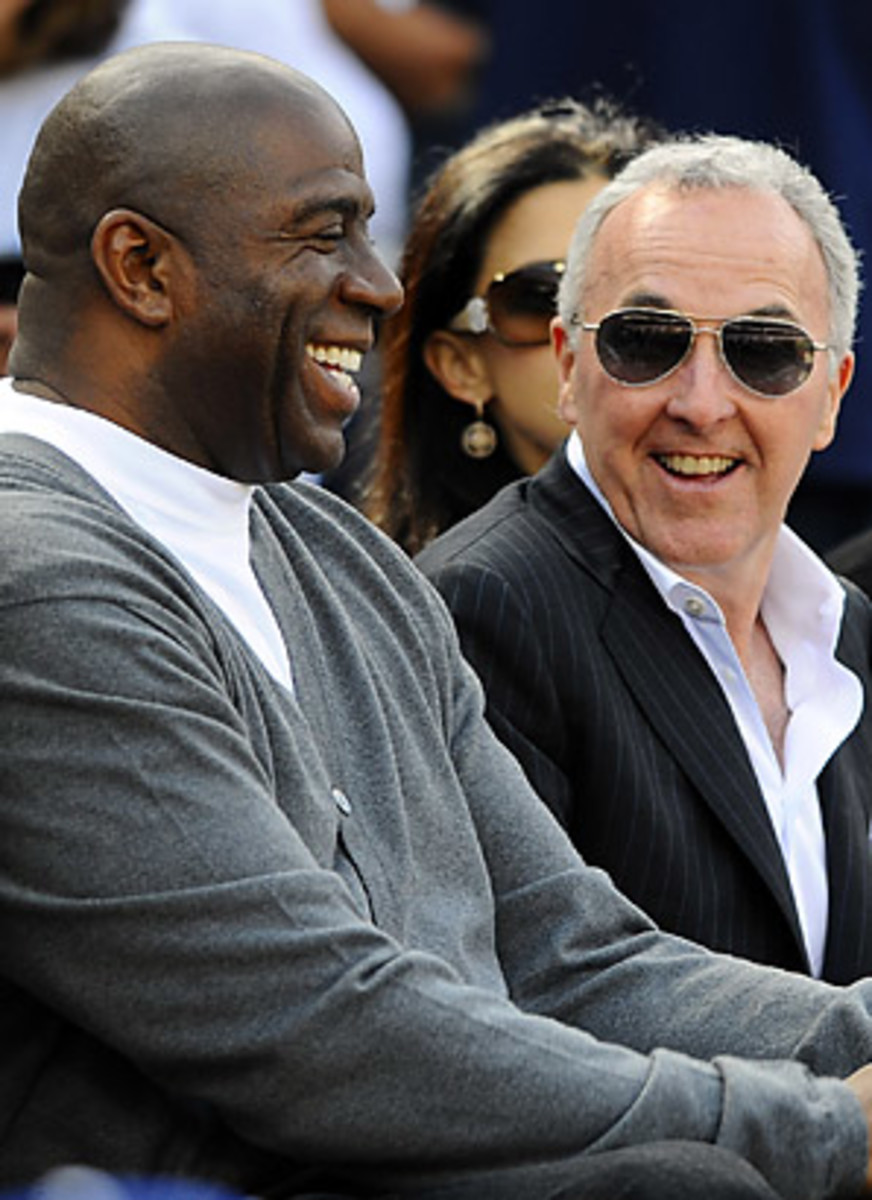
MLB concerned with lack of details from Dodgers' winning bidder
Major League Baseball officials have expressed concern that Guggenheim Baseball Management, the winning bidders for the Los Angeles Dodgers, has been slow to produce the details of the bid and the structure of its management team, according to several sources familiar with the sale process.
Several individual owners have joined baseball officials in questioning why the Guggenheim group, led by Mark Walter, Stan Kasten and Magic Johnson, has not filed a more detailed Purchase and Sale Agreement more than a week after the group was selected from among three finalists by Frank McCourt, the outgoing owner who is selling the club through U.S. Bankruptcy Court.
The group was expected to file a Purchase and Sale Agreement with MLB earlier this week, but postponed the filing for two days before submitting a short form agreement that lacked what MLB regards as most of the necessary details. Of particular interest to MLB is a breakdown of where the money is coming from to cover the $2.15 billion sale price and what role McCourt has in the ownership, control and profit-sharing of the Dodger Stadium parking lots.
Until MLB knows and reviews those details, according to sources, concern mounts about how the deal is financed and especially if McCourt stands to continue to profit from Dodger-related operations under the new ownership.
Some answers may be forthcoming as soon as Friday, when terms of the sale are expected to be filed in bankruptcy court. The court is expected to approve the sale on April 13 in advance of a final closing April 30, when McCourt must pay his wife, Jamie, $131 million as a condition of their divorce settlement.
Said one owner after speaking with commissioner Bud Selig, "Not having a purchase and sale agreement is scary, but I personally think they will close [the deal]."
The sale, according to sources, has been complicated by the bitter relationship between McCourt and MLB, by the Guggenheim group being caught between trying to satisfy both warring parties, by a bankruptcy court, not MLB, controlling the speed of the sale, and by the lingering contentiousness of the bidding process, which one bidder said was characterized by "brutal fighting."
MLB, as part of its agreement with McCourt, approved three finalists in the bidding, including the Guggenheim group at an initial bid of $1.6 billion. The other finalists were hedge fund manager Steve Cohen and St. Louis Rams owner Stan Kroenke, who owns several other pro sports teams. On the eve of a scheduled auction, McCourt struck a quick agreement with the Guggenheim group at $2.15 billion, a record for a sports franchise, which included an ownership stake for McCourt in the lucrative parking lots.
Though MLB approved the Guggenheim group as a finalist, it was concerned about the amount of "institutionalized" money it presented in its initial bid, according to one owner. Some of the money is expected to come from insurance companies Guggenheim controls. MLB prefers individual investors, especially local ones.
According to sources not involved in the sale, the Guggenheim group has reached out to wealthy Los Angeles individuals as potential investors, though one source familiar with the group's plans said that although the final number was $550 million higher than the initial bid, the money is coming from "the same pre-approved sources. This is moving along. The judge is committed to getting this done by the 30th of April, and he's in charge."
MLB informed bidders that it retains the right to review its approvals if the final sale is significantly altered in money and structure from the initial bid.
The sale has been described as an "all-cash" deal, which means the new owners do not plan to assume new debt. The value of the Dodgers is especially tied to a battle for the team's local television rights, which are expected soar past the 17-year, $3 billion deal between McCourt and Fox that Selig rejected last year. One Los Angeles investor who briefly inquired into the sale of the team speculated that the TV deal could net the Dodgers "closer to $5 billion than $3 billion."





